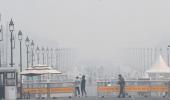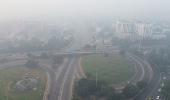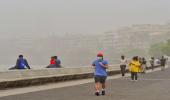Delhi's air quality took a turn for the worse on Monday, with areas like Dwarka, Mundka and Najafgarh recording a maximum AQI of 500 in the afternoon.

People complained of itchy and watery eyes as a dense layer of smog continued to envelop the national capital. The city's Air Quality Index (AQI) was recorded at 484, the worst this season, at 8 am on Monday.
By 2 pm, the AQI worsened further and it was recorded at 491, according to the Central Pollution Control Board (CPCB).
Data from 37 out of 40 monitoring stations revealed that four stations Dwarka Sector 8, Najafgarh, Nehru Nagar and Mundka reported AQI levels at the maximum of 500, according to the SAMEER app, which provides hourly updates on the National AQI.
With the AQI crossing 450, the Commission for Air Quality Management (CAQM) in the National Capital Region (NCR) and adjoining areas ordered the implementation of Graded Response Action Plan (GRAP) Stage-IV restrictions in Delhi-NCR.
As the city's air quality is in the "severe plus" category, doctors have warned of health risks for all.
"At this level of pollution, wearing an N95 mask is not an option but a necessity. Even healthy individuals can face respiratory illnesses and other health complications," said Dr Rajat Sharma, resident doctor of Community Medicine at UCMS & GTB Hospital.
Ujjwal Parakh, senior consultant, Department of Chest Medicine at Sir Ganga Ram Hospital, emphasised that people need to be extremely cautious at this time due to the hazardous air quality.
"Everyone should avoid outdoor activities as much as possible and use masks to reduce the effects of air pollution if they must go out," he said.
Meanwhile, the Supreme Court questioned the Delhi government over delay in implementation of stricter anti-pollution measures under GRAP-4 and said it will not allow scaling down of the preventive measures without its prior permission.
It told the state government that the court wants to know what steps it has taken to curb the alarming rise of pollution level.
"We won't allow scaling down of preventive measures under stage 4 even if AQI goes below 450. Stage 4 will continue till court permits," a bench of Justices Abhay S Oka and Augustine George said, adding it will hear the matter in detail at the end of the day's work.
Addressing a press conference, Delhi Chief Minister Atishi alleged that the BJP-led central government has been doing politics over the issue of pollution but has taken no step to check stubble burning in states like Haryana, Rajasthan, Uttar Pradesh and Madhya Pradesh -- all ruled by the saffron party.
Lauding the AAP-ruled Punjab, she said it is the only state where the cases of stubble burning have come down significantly. In the BJP-ruled states, they have gone up, she claimed.
As Delhi's air quality worsened to the "Severe Plus" category, tighter pollution control measures came into effect on Monday morning, including a ban on truck entry and the suspension of construction activities at public projects.
There has been a rise in the sale of air purifiers.
Vijendra Mohan, owner of Air Expert India, a dealership shop in Indrapuram, reported a surge in air purifier sales following the severe air pollution levels.
"We have seen a remarkable increase in demand, with daily sales jumping from 20 to 40 units per day, especially after Diwali. Previously, we'd sell around 20 purifiers per day. Now, we are selling around 40 air purifiers per day," he said.
According to an order issued by CAQM on Sunday, no trucks will be allowed in Delhi except for those carrying essential items or using clean fuel (LNG/CNG/BS-VI diesel/electric).
Non-essential light commercial vehicles registered outside Delhi will also be prohibited, except for EVs and CNG, and BS-VI diesel ones.
Delhi-registered BS-IV or older diesel medium and heavy goods vehicles are banned except for those in essential services, the order said.
All construction activities, including highways, roads, flyovers, power lines, pipelines and other public projects, have been suspended.
The CAQM recommended that offices in the NCR work at 50 per cent capacity, with the rest working from home.
The Delhi government asked all schools to discontinue physical classes for all students, except those in classes 10 and 12, from Monday.
An AQI of 400 or higher is deemed 'severe' and it can have an adverse effect on both healthy individuals and people who already have medical conditions.
First implemented in 2017, the GRAP is a set of anti-air pollution measures followed in the capital and its vicinity according to the severity of the situation.
It classifies the air quality in the Delhi-NCR under four different stages: Stage 1 - 'poor' (AQI 201-300), Stage 2 - 'very poor' (AQI 301-400), Stage 3 - 'severe' (AQI 401-450) and Stage 4 - 'severe plus' (AQI above 450).
Additionally, dense toxic smog caused visibility to drop sharply in the morning. According to officials, visibility at Safdarjung airport was 150 metres.
Delhi recorded a minimum temperature of 16.2 degrees Celsius, 3.9 degrees above normal. The maximum temperature is expected to settle at 27 degrees Celsius, according to the India Meteorological Department (IMD).











 © 2025
© 2025